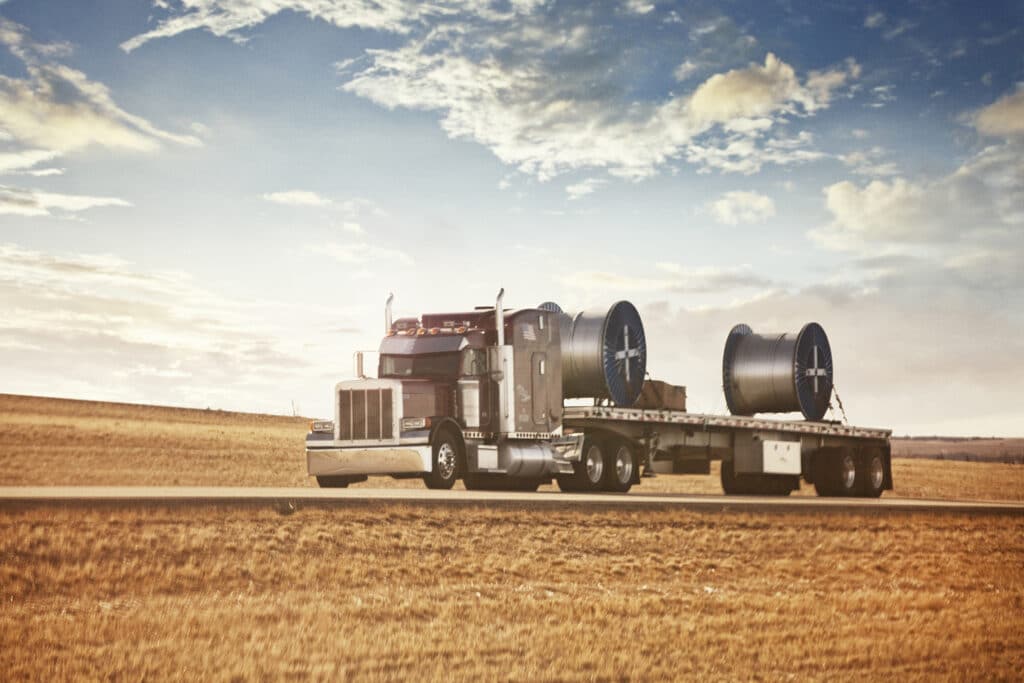Many accidents occur every year because an improperly secured load falls off a flatbed semi trailer. In some cases, vehicles behind the trailer strike, or are struck by, objects and are damaged. Flying cargo can also damage property adjacent to the roadway. In addition, the sudden shifting of a load can cause the truck driver to lose control of the rig, resulting in a single-vehicle accident.

For these and other reasons, whether you rent a flatbed semi trailer or have your own equipment, it’s vital that you know how to immobilize any loads you haul.
Best Practices for Securing Loads on Flatbed Trailers
A flatbed trailer’s open design makes it easy to move cargo onto or off of it. Of course, it also makes it easy for cargo to move off the trailer on its own! Consequently, you should take these steps every time you’re preparing to get on the road with a loaded trailer:
- Consider the characteristics of the load. An item’s weight, shape, wind resistance and other factors affect how likely it is to shift during transport. In preparing to secure a load, take a few minutes to think about the physics of accelerating, stopping and turning with it on your flatbed. Also, you need to be familiar with any applicable laws or regulations regarding the load you’re hauling, particularly if it’s especially large or heavy.
- Find and inspect the trailer’s anchor points. Before loading the trailer, you need to know where to attach the restraints you’ll be using so you don’t cover them with cargo. If you have questions about the capacities of these tie-down points, like when using a rental flatbed trailer for example, be sure to get them answered in advance.
- Distribute the load evenly on the trailer. As much as possible, spread the weight of your cargo across the trailer bed. You should also load heavier items or material on the bed itself and stack upward from there with lighter cargo.
- Make a plan before you begin. When securing a load on a flatbed, just “playing it by ear” as you make your way around the trailer isn’t a good strategy. It’s much better to have a clear mental picture of the end result before you start.
- Communicate clearly with anyone assisting you. You may know exactly how you intend to secure a load, but if someone helping you doesn’t share your vision, that can be a problem, especially if they’re out of sight on the other side of the trailer. Explain your plan to them and check their work before you start driving.
- Select the right items for the job. For example, chains of sufficient thickness can be very strong. However, they may cause damage to certain types of loads. Straps and ropes aren’t as strong as chains, but are easier on cargo. Wedges, blocks and chocks can be an important part of your load-securing strategy if you are hauling things that can roll—pipes, vehicles, etc.—and nets can be used to help secure loose materials. Whatever types of restraints you use, it’s critical that you know their rating in terms of how much weight they can handle.
- Put cushioning between items if appropriate. The risk of cargo falling off isn’t the only one you face when using a flatbed trailer. Items that aren’t properly secured can damage one another if they shift in transit.
- Cover the load if appropriate. If you’re carrying materials that can be blown off the trailer or items that have components that can be damaged by the force of the wind as you travel down the highway, be sure to put a tarp or other covering over the load and fully secure that covering.
- Do a worst-case-scenario walkaround. Before you get on the road, walk around the trailer and envision it and the load it’s carrying responding to the most difficult conditions you can imagine—huge potholes, high winds, emergency swerving and braking, etc. You should definitely hope for the best but plan for the worst.
- Check the load periodically as you drive. If you’re making a long trek, walk around the trailer every time you stop for gas, food or a rest break and look for any indicators that the load is shifting, restraints are being damaged, etc. Have extra restraints with you so you can replace or reinforce those you’re already using if necessary.
Time Invested Equals Money Saved
Whether it’s the cost of repairing damage to your trailer or cab, legal liability when dropped cargo causes property damage or injuries, or damage to your company’s reputation when you make the news for blocking a busy highway with debris, failing to secure a load carefully and completely can be extremely costly. The time you take to understand your cargo, your flatbed trailer and the devices you’ll use to immobilize the load is time well spent.
And, while going through 10 steps to secure cargo on a flatbed trailer may seem like a lot of work, the reality is that once you’ve gone through the process a few times, you’ll find that you can complete it more quickly and efficiently each time. Seasoned truck drivers become skilled at quickly detecting potential problems before they occur and taking action to address them.
They also develop a keen sense for when something’s “not right” with a load while they’re on the road and a willingness to stop and make modifications as needed. But it all starts with understanding the fundamentals of securing loads and never assuming that a trip will go smoothly.
Finding the Right Flatbed Trailers for Rent or Lease
Protecting the load you’re hauling requires having a smart strategy for securing it, but it also requires a flatbed trailer that’s in great working condition. At Boxwheel, we understand that, and we only rent or lease top-quality equipment that has been meticulously maintained.
To learn more about our inventory of flatbed trailers, as well as our dry van trailers, liftgate trailers and refrigerated trailers for rent or lease, please contact us at your convenience.
About Boxwheel Trailer Leasing
Boxwheel Trailer Leasing was founded on the idea that leasing semi trailers doesn’t have to be complicated. Leveraging decades of experience in trailer leasing and sales, our team of industry veterans has eliminated the red tape and mountains of paperwork to make getting on the road with a leased, rented or purchased trailer easy, affordable, and safe. https://boxwheel.com
Boxwheel Trailer Leasing
Media Contact
Mike Di Paolo | Co-Owner
(720) 527-2992
By: By: Brand Storytelling Platform KISS PR







